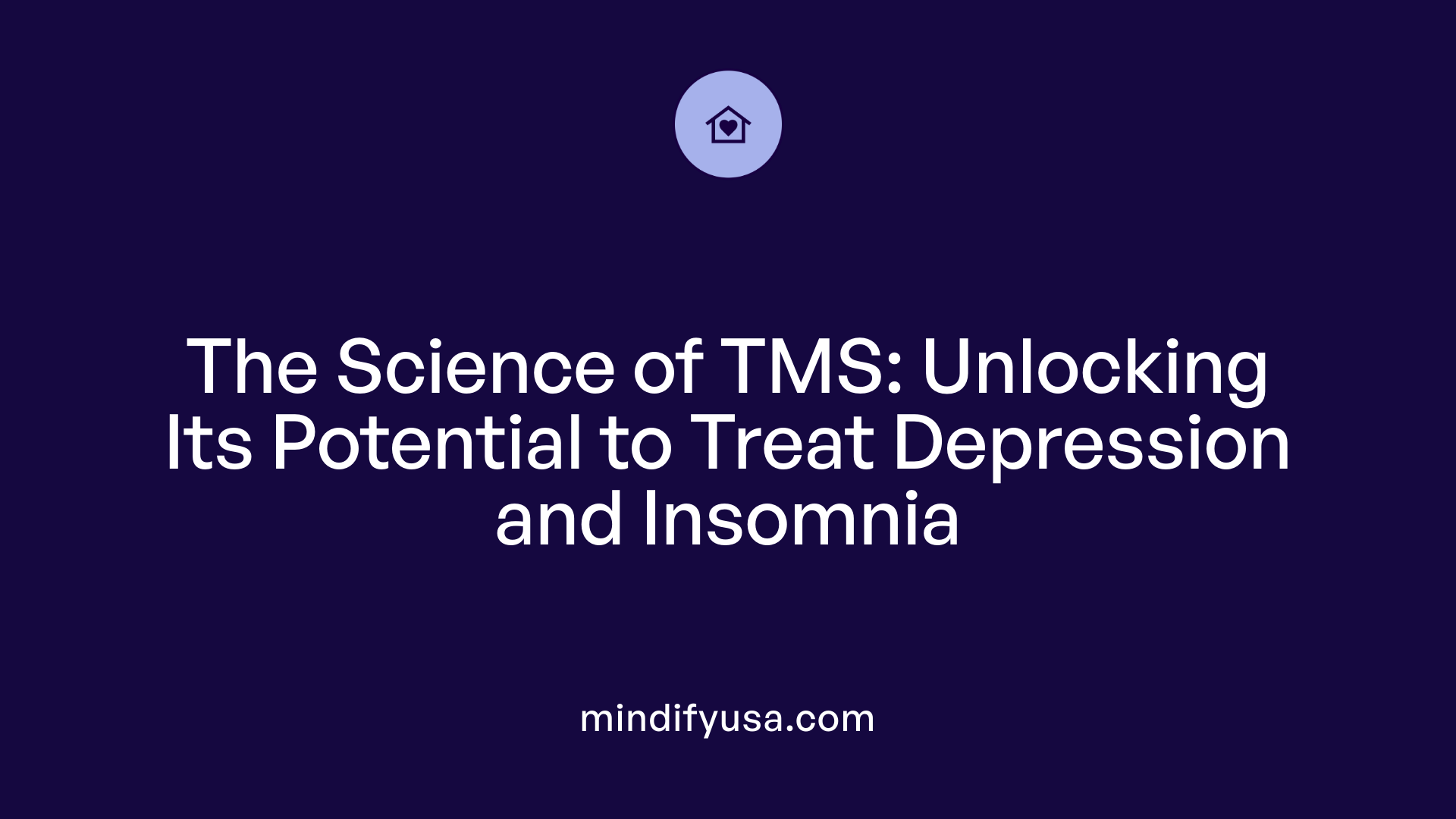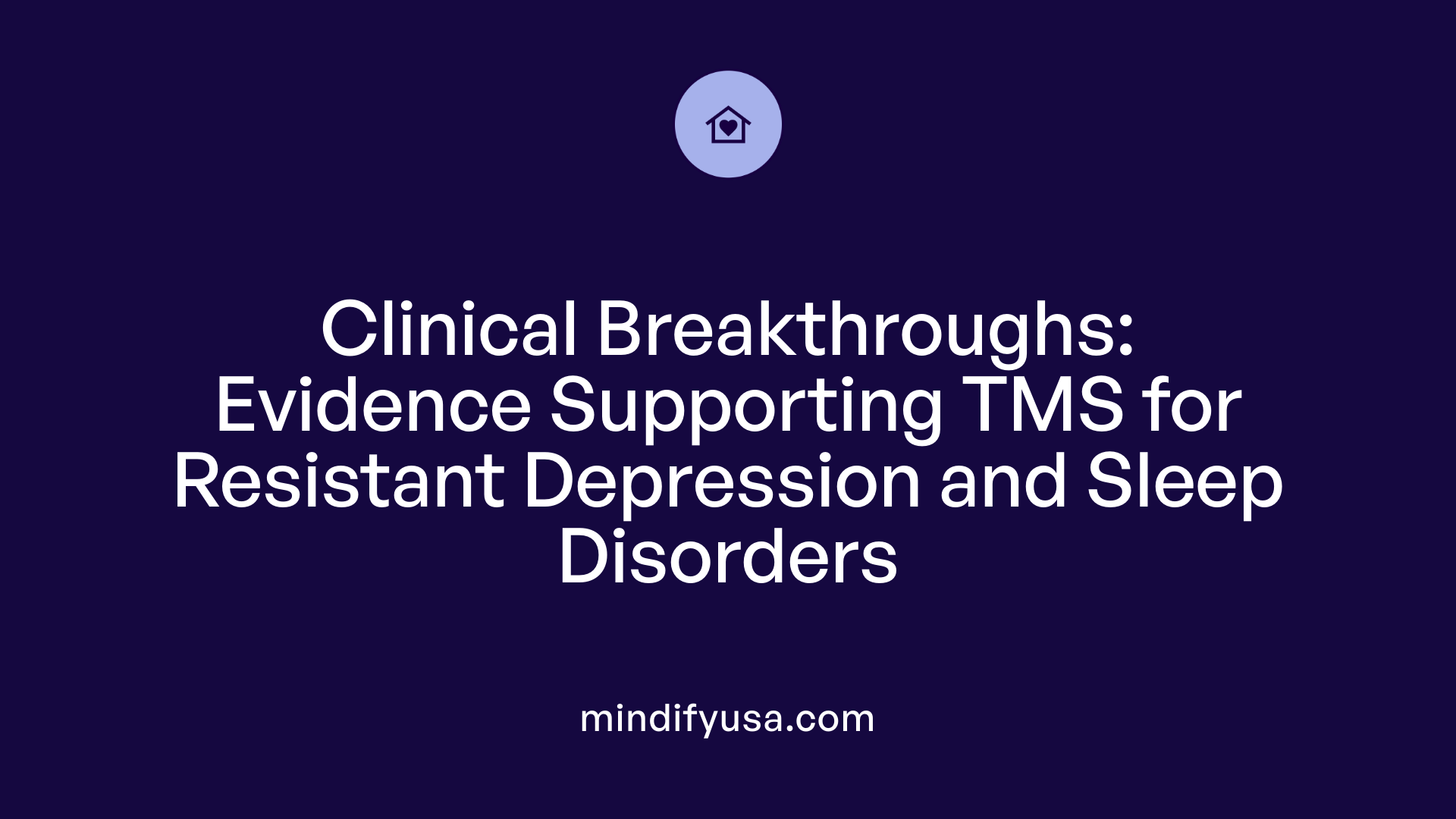Bridging the Gap Between Sleep and Mental Health
Insomnia and depression often coexist, each worsening the other and creating a complex challenge for patients and clinicians alike. Emerging as a promising solution is Transcranial Magnetic Stimulation (TMS), an FDA-approved, non-invasive treatment that not only targets depression but also shows significant efficacy in alleviating insomnia. This article explores how TMS is reshaping comprehensive mental health services by addressing these intertwined conditions, improving patient outcomes through targeted brain stimulation.
Understanding Comprehensive Mental Health Services and Their Role in Treating Depression and Insomnia

What types of mental health services are typically included in a comprehensive program?
Comprehensive mental health services encompass a wide array of support options tailored to address both mental health conditions and substance use disorders. These programs typically feature assessment and diagnosis, followed by treatments which may include medication management, individual and group psychotherapy, and residential care when needed.
Scope of comprehensive mental health services
These services are designed to meet diverse needs, ranging from outpatient treatment to crisis support. For example, agencies like SAMHSA support public health initiatives, supply accessible helplines such as the 988 Suicide & Crisis Lifeline, and promote prevention campaigns targeting issues like substance misuse and youth mental health.
Integration of mental health and substance use disorder treatments
Mental health programs often integrate treatments for co-occurring conditions, recognizing the overlap between substance use and mental health challenges. Interventions include medication-assisted treatments, withdrawal management, and recovery support services to address the full spectrum of behavioral health needs.
Available interventions including medication, psychotherapy, crisis support, and emerging technologies
Along with traditional therapies and medication, emerging treatments such as transcranial magnetic stimulation (TMS) offer promising alternatives, especially for treatment-resistant depression and related conditions like insomnia. TMS is a non-invasive, FDA-approved procedure that uses magnetic pulses to stimulate brain regions involved in mood and sleep regulation. It is typically administered as daily outpatient sessions over several weeks, with patients remaining alert and able to resume daily activities immediately after treatment.
Together, these comprehensive services provide a robust framework to support individuals struggling with depression, insomnia, and related disorders, promoting recovery through a variety of effective treatment modalities.
The Science Behind TMS: How Magnetic Stimulation Targets Depression and Insomnia

How Does TMS Work? Understanding the Mechanism
Transcranial magnetic stimulation (TMS) is a non-invasive procedure that uses focused magnetic pulses to stimulate nerve cells in the brain. In repetitive TMS (rTMS), magnetic pulses are delivered repeatedly to activate brain areas that are underactive, especially regions involved in regulating mood.
Which Brain Regions Does TMS Target?
TMS primarily targets the dorsolateral prefrontal cortex, a key brain region linked to mood regulation and implicated in depression. For insomnia treatment, additional areas such as the posterior parietal cortex are targeted to influence sleep regulation.
What Role Do Magnetic Pulses Play?
These magnetic pulses temporarily increase neural activity where they are applied, promoting greater connectivity and activation in underperforming neural circuits. This increased neuroactivity can help alleviate symptoms of depression by restoring function to specific brain networks.
How Does fMRI Guide Personalized Treatment?
fMRI imaging allows clinicians to identify specific abnormal neural network connectivity patterns in each patient. This personalized targeting ensures magnetic pulses stimulate the precise regions needed, improving treatment accuracy and effectiveness for both depression and insomnia.
How Does TMS Affect Neural Networks?
Research shows TMS can modulate brain networks associated with mood and sleep, impacting biological systems like the hypothalamic-pituitary-adrenal and hypothalamic-pituitary-thyroid axes. This modulation can normalize brain activity, improving symptoms of mental health disorders and sleep quality simultaneously.
Clinical Evidence Supporting TMS for Treatment-Resistant Depression and Insomnia

FDA Approval and Clinical Efficacy for Depression and OCD
Transcranial Magnetic Stimulation (TMS) is FDA-approved for treating adults aged 22–70 with Major Depressive Disorder (MDD) and as an add-on therapy for adolescents aged 15–21 with treatment-resistant depression. TMS is also cleared for managing obsessive-compulsive disorder (OCD) in adults. It is recommended especially for patients who have not responded adequately to antidepressant medication and psychotherapy.
Statistical Outcomes Including Improvement and Remission Rates
Clinical data highlights substantial benefits of TMS treatment: approximately 83% of patients experience improvement in depression severity, with 62% achieving complete remission. NeuroStar TMS, a leading system, has treated over 188,000 patients with less than 5% reporting side effects, predominantly mild headaches.
Key Studies on TMS Efficacy for Chronic Insomnia Including Sleep Quality Improvements
Beyond depression, TMS shows promise in treating chronic insomnia by targeting brain regions like the dorsolateral prefrontal cortex implicated in sleep regulation. A 2013 randomized controlled trial with 120 patients found low-frequency TMS increased total sleep time by 25%, improved REM sleep quality, and sustained these benefits longer than medication or cognitive behavioral therapy. Further meta-analyses confirm TMS's safety and efficacy in improving sleep stages critical for mental health.
Safety Profile and Side Effects of TMS Compared to Other Treatments
TMS is a non-invasive, outpatient procedure with a favorable safety profile. Common side effects include mild headaches, scalp discomfort, and tingling sensations, which generally diminish over time. Unlike electroconvulsive therapy (ECT), TMS does not cause memory loss or require anesthesia. Seizure risk is very low when applied according to safety guidelines.
Long-Term Benefits and Maintenance Therapy Potential
Typically involving daily sessions over 4 to 6 weeks, TMS offers symptom relief that may last months or longer. Maintenance sessions and retreatments for recurring symptoms are under study to enhance long-term outcomes and prevent relapse. This positions TMS as a promising option for enduring management of treatment-resistant depression and concomitant insomnia symptoms.
Patient Experience and Treatment Process with TMS
Typical Treatment Duration and Session Length
TMS therapy typically involves a course of daily treatments conducted five times per week, spanning approximately 4 to 6 weeks. Each session generally lasts between 19 to 37 minutes, with many protocols averaging around 30 minutes. The NeuroStar system, a widely used FDA-cleared device, commonly requires about 36 sessions for complete treatment. These sessions allow the patient to remain awake and alert throughout the procedure.
Patient Preparation and Evaluation Protocols
Before beginning TMS treatment, patients undergo a thorough evaluation process that includes mental health assessments, physical exams, and a review of medical history to exclude contraindications such as implanted medical devices or metal in the body. Initial sessions involve personalized treatment site mapping and determination of magnetic pulse thresholds to ensure optimal targeting of underactive brain areas associated with mood regulation.
Sensory Experience During TMS Sessions
During the treatment, patients often feel a mild tapping sensation on the scalp, which is generally well tolerated. Some may experience mild discomfort such as headaches or tingling but these symptoms usually lessen over time. To counteract the clicking noise produced by the magnetic coil, patients are typically provided with earplugs. Importantly, there is no pain involved, and patients remain fully conscious throughout.
Ability to Maintain Daily Activities Immediately After Treatment
One of the major advantages of TMS therapy is its non-invasive nature, which allows patients to resume their normal daily activities immediately after each session. There is no requirement for anesthesia or hospitalization, making it a convenient option for many individuals managing depression and other mental health disorders.
Insurance Coverage and Accessibility of TMS Therapy
TMS treatment is covered by most major insurance providers including Medicare, Tricare, and private insurers such as Blue Cross and Aetna. Facilities like Virtua and Northeast Health Services accept a wide range of insurance plans, improving accessibility for over 300 million Americans. Insurance coverage helps make this innovative treatment more affordable for those with treatment-resistant conditions.
The Link Between Sleep Disturbances and Mental Health Disorders
Prevalence and Impact of Chronic Insomnia in Mental Health Patients
Chronic insomnia affects millions worldwide and is especially common among those with mental health disorders. It impairs cognitive functions and emotional regulation, significantly worsening quality of life and treatment outcomes.
How Insomnia Exacerbates Depression, Anxiety, PTSD, and Cardiovascular Risks
Insomnia not only deepens symptoms of depression, anxiety, and PTSD but also increases the risk of cardiovascular diseases. Poor sleep triggers a cycle where mental health declines, which then further disrupts sleep patterns.
Physiological Mechanisms Linked to Sleep Problems
Dysregulation of the hypothalamic-pituitary-adrenal (HPA) and hypothalamic-pituitary-thyroid (HPT) axes is strongly associated with sleep disturbances. These systems control stress response and metabolism, and their imbalance can worsen insomnia and related mental health problems.
Benefits of Improving Sleep Quality on Overall Mental Health Outcomes
Targeted therapies that improve sleep, like transcranial magnetic stimulation (TMS), can restore normal sleep cycles including REM and slow-wave sleep. Enhanced sleep quality helps alleviate mental health symptoms, supporting better emotional stability and reducing relapse risk.
This interconnectedness highlights the importance of addressing sleep alongside mental health treatments to promote comprehensive recovery and improved well-being.
Future Perspectives: Expanding the Role of TMS in Integrated Mental Health Care

How can maintenance and repeat TMS sessions prevent relapse?
Maintenance TMS sessions are emerging as a promising tool for preventing relapse in patients who respond well to initial treatment. These sessions allow for ongoing modulation of brain activity to sustain symptom relief, potentially reducing the need for more intensive interventions. If depressive symptoms recur after the initial course, repeat treatments can be administered to restore symptom control.
What broader applications of TMS are being explored?
Beyond depression, TMS is expanding into treatment for anxiety disorders, post-traumatic stress disorder (PTSD), obsessive-compulsive disorder (OCD), migraines, nicotine addiction, and neurological diseases such as Parkinson’s and Alzheimer’s. Research also suggests potential benefits for schizophrenia, chronic pain, multiple sclerosis, and insomnia, indicating TMS’s versatility in addressing various brain-related conditions.
How is TMS being integrated into comprehensive mental health programs?
Healthcare providers are increasingly incorporating TMS into holistic mental health plans, combining it with medication, psychotherapy, and behavioral interventions. This approach ensures a more personalized, effective treatment by addressing multiple facets of mental health conditions simultaneously. Agencies like SAMHSA support these integrations by offering resources and guidelines to optimize patient outcomes.
What is the significance of growing acceptance and media recognition of TMS therapy?
Media coverage from outlets such as National Geographic, Scientific American, and Harvard Health Foundation has increased public awareness and confidence in TMS. This growing recognition enhances acceptance among both clinicians and patients, encouraging wider adoption. Insurance coverage from major providers also reflects this acceptance, making treatment more accessible to millions.
What innovations are shaping the future of TMS?
Technological advances, like using functional MRI (fMRI) to guide treatment, enable precise targeting of brain regions implicated in individual conditions. Personalized protocols based on patient-specific brain mapping optimize therapeutic outcomes. Continued development of FDA-cleared systems, such as the NeuroStar device, along with refined treatment schedules, contribute to increasing efficacy and patient convenience.
Together, these trends point toward an expanded, refined role for TMS as an integral component of mental health care, delivering tailored, non-invasive therapy across a spectrum of disorders and improving long-term patient wellbeing.
Expanding Horizons in Mental Health Treatment with TMS
Transcranial Magnetic Stimulation represents a significant advancement in the treatment of depression and its often-accompanying insomnia. By harnessing targeted brain stimulation, TMS not only alleviates core depressive symptoms but also restores healthier sleep patterns, crucial for sustained mental well-being. As research continues and technology evolves, TMS is becoming an integral part of comprehensive mental health services, offering hope and improved quality of life for patients who have struggled with conventional therapies. This dual-acting modality exemplifies the future of mental health care — personalized, effective, and holistic.
References
- Home | SAMHSA - Substance Abuse and Mental Health ...
- Transcranial magnetic stimulation
- TMS Therapy | Depression Treatment Services in MA
- Transcranial Magnetic Stimulation (TMS)New York, NY
- Transcranial Magnetic Stimulation (TMS) – Treatment For ...
- TMS for Insomnia | Non-Drug Therapy | Neurotherapeutix
- The TMS Center of New Jersey - Cutting Edge Depression ...
- TMS Therapy | Transcranial Magnetic Stimulation





































































































